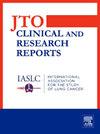荟萃分析探讨酪氨酸激酶抑制剂诱导的癌基因依赖性非小细胞肺癌体重增加
IF 3.5
Q2 ONCOLOGY
引用次数: 0
摘要
背景:对于接受酪氨酸激酶抑制剂(TKIs)治疗的癌基因依赖性非小细胞肺癌患者,体重增加作为一种常见的治疗相关效应最近引起了人们的关注。考虑到体重增加对患者生活质量和长期预后的潜在影响,识别那些与体重增加更频繁相关的tki对于进一步表征身体成分相关改变、深化其代谢影响和指导治疗决策至关重要。方法系统检索PubMed、Scopus、Cochrane和会议资源。我们进行了一项荟萃分析来量化体重增加的幅度,并应用荟萃回归来探讨这种副作用与人口统计学和临床参数之间的关系。在2009年1月至2024年12月的7596项研究中,18项报告体重增加数据的关键试验被纳入最终分析,共包括25个组。Lorlatinib显示治疗引起的体重增加的风险最高[发生率36%;95%置信区间(CI): 26%-46%;I2 = 92%],其次是阿勒替尼[发生率15%;95% ci: 12%-18%;I2 = 52%]和克唑替尼[发病率5%;95% ci: 0%-13%;I2 = 93%]。奥西替尼和厄洛替尼体重增加的发生率最低。meta回归显示体重增加、性别、年龄和运动状态之间无显著相关性,因此提示药物特异性作用。结论:我们的研究结果证实了氯拉替尼在体重增加方面的独特特征,与患者的特征无关。考虑到TKIs在癌基因成瘾的非小细胞肺癌中可实现的令人印象深刻的预后前景,应优先考虑充分的临床试验报告、体重增加的评估和监测、身体成分改变和对生活质量的影响,以及适当的基于生活方式的管理策略。本文章由计算机程序翻译,如有差异,请以英文原文为准。
Meta-Analysis Exploring Tyrosine Kinase Inhibitor-Induced Weight Gain in Oncogene-Addicted NSCLC
Background
For patients with oncogene-addicted NSCLC treated with tyrosine kinase inhibitors (TKIs), weight gain has recently gained attention as a frequent treatment-related effect. Identifying those TKIs more frequently associated with weight gain is crucial for further characterizing body composition-related modifications, deepening their metabolic impact, and guiding treatment decisions, considering the potential influence of weight gain on patients' quality of life and long-term outcomes.
Methods
A systematic search was conducted across PubMed, Scopus, Cochrane, and meeting resources. A meta-analysis was conducted to quantify the magnitude of weight gain, and meta-regression was applied to explore the association between this side effect, and demographic and clinical parameters.
Results
Among 7596 identified studies from January 2009 to December 2024, 18 pivotal trials reporting weight gain data were included in the final analysis, encompassing a total of 25 arms. Lorlatinib revealed the highest risk of treatment-induced weight gain [incidence 36%; 95% confidence interval (CI): 26%–46%; I2 = 92%], followed by alectinib [incidence 15%; 95% CI: 12%–18%; I2 = 52%] and crizotinib [incidence 5%; 95% CI: 0%–13%; I2 = 93%]. Osimertinib and erlotinib indicated the lowest incidence of weight gain. The meta-regression revealed no significant correlation among weight gain, sex, age, and performance status, thus suggesting a drug-specific effect.
Conclusions
Our findings confirmed the unique profile of lorlatinib regarding weight gain, regardless of patient characteristics. Considering the impressive prognostic horizons achievable with TKIs in oncogene-addicted NSCLC, adequate reporting in clinical trials, assessment and monitoring of weight gain, body composition modifications, and impact on quality of life should be prioritized, together with adequate lifestyle-based strategies for its management.
求助全文
通过发布文献求助,成功后即可免费获取论文全文。
去求助
来源期刊

JTO Clinical and Research Reports
Medicine-Oncology
CiteScore
4.20
自引率
0.00%
发文量
145
审稿时长
19 weeks
 求助内容:
求助内容: 应助结果提醒方式:
应助结果提醒方式:


